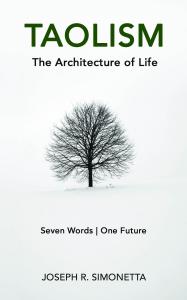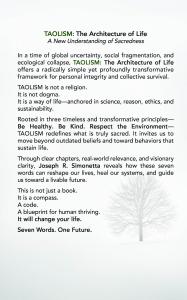New Book Launches a Movement to Redefine Sacredness in the Modern Age
TAOLISM: The Architecture of Life urges humanity to replace outdated beliefs with ethical behavior grounded in reality
In his new book, TAOLISM: The Architecture of Life, Simonetta introduces a powerful worldview grounded not in belief, but in behavior. TAOLISM (short for The Architecture of Life) offers a framework for ethical living rooted in science, reason, ethics, and sustainability—guided by just three core principles, expressed in seven transformative words:
Be Healthy. Be Kind. Respect the Environment.
“This is not religion. It’s not dogma. It’s not another ideology,” says Simonetta. “It’s a way of being—deeply practical, urgently needed, and universally applicable. These seven words, if widely adopted, will change everything.”
TAOLISM challenges humanity to evolve—by aligning with the very architecture of life itself. Drawing on decades of multidisciplinary work and lived experience, Simonetta presents a compelling case for replacing superstition with responsibility, worship with action, and faith with observable truth.
From personal well-being to politics and public policy, from education to economics, the book explores how TAOLISM can reshape every aspect of our lives—offering a blueprint for human thriving at a time when nothing less will do.
Simonetta, a Harvard-educated ethicist, professional athlete, former U.S. Army officer, and TEDx speaker, delivers this work not as abstract theory but as an urgent call to action.
TAOLISM: The Architecture of Life is available now in paperback, eBook, and audiobook formats on Amazon and at www.taolism.org.
________________________________________
ABOUT THE AUTHOR
Joseph R. Simonetta is a writer, speaker, environmentalist, and visionary committed to advancing human civilization through ethics, reason, and sustainability. With degrees in business (Penn State), architecture (University of Colorado), and divinity (Harvard), he brings a uniquely integrative perspective to the challenges of our time. He is also a national champion senior triathlete and the creator of TAOLISM, a movement to reframe sacredness as life-sustaining behavior.
Joseph R Simonetta
Self
+1 9419938393
email us here
Legal Disclaimer:
EIN Presswire provides this news content "as is" without warranty of any kind. We do not accept any responsibility or liability for the accuracy, content, images, videos, licenses, completeness, legality, or reliability of the information contained in this article. If you have any complaints or copyright issues related to this article, kindly contact the author above.
BMJ Physiotherapy Expands to One@Kentridge Medical Centre Adjacent to NUH
New Book Reveals Untold Story of Royalty in America
Puraffinity and U.S. Army Corps of Engineers Partner to Advance PFAS Remediation Technologies
Kalendarium
Więcej ważnych informacji
 Jedynka Newserii
Jedynka Newserii

 Jedynka Newserii
Jedynka Newserii

Prawo

KE proponuje nowy Fundusz Konkurencyjności. Ma pobudzić inwestycje w strategiczne dla Europy technologie
W środę 16 lipca Komisja Europejska przedstawiła projekt budżetu na lata 2028–2034. Jedna z propozycji zakłada utworzenie Europejskiego Funduszu Konkurencyjności o wartości ponad 400 mld euro, który ma pobudzić inwestycje w technologie strategiczne dla jednolitego rynku. Wśród wspieranych obszarów znalazła się obronność i przestrzeń kosmiczna. Na ten cel ma trafić ponad 130 mld euro, pięciokrotnie więcej niż do tej pory.
Firma
Były prezes PGE: OZE potrzebuje wsparcia magazynów energii. To temat traktowany po macoszemu

Choć udział odnawialnych źródeł energii w miksie energetycznym Polski jest stosunkowo wysoki i rośnie, to ten przyrost jest chaotyczny i nierównomiernie rozłożony miedzy technologiami – wskazuje Forum Energii. Dodatkowo OZE potrzebują wsparcia magazynów energii, a zdaniem Wojciecha Dąbrowskiego, prezesa Fundacji SET, ten temat jest traktowany po macoszemu. Brak magazynów powoduje, że produkcja energii z OZE jest tymczasowo wyłączana, co oznacza marnowanie potencjału tych źródeł.
Infrastruktura
Wzrost wynagrodzeń ekip budowlanych najmocniej wpływa na koszty budowy domu. Zainteresowanie inwestorów mimo to nieznacznie wzrasta

Budowa metra kwadratowego domu w Polsce kosztuje od 5,55 do 6 tys. zł w zależności od województwa – wynika z najnowszych analiz firmy Sekocenbud. Najdrożej jest w Warszawie, gdzie cena za metr kwadratowy domu przekroczyła już 6,2 tys. zł. Na przyrosty kosztów budowy domu wpływają zarówno drożejące materiały budowlane, jak i wyższe wynagrodzenia pracowników. Inwestorzy nie rezygnują jednak z budowy domów jednorodzinnych, co ma związek m.in. z wciąż wysokimi cenami mieszkań czy też obniżką stóp procentowych.
Partner serwisu
Szkolenia

Akademia Newserii
Akademia Newserii to projekt, w ramach którego najlepsi polscy dziennikarze biznesowi, giełdowi oraz lifestylowi, a także szkoleniowcy z wieloletnim doświadczeniem dzielą się swoją wiedzą nt. pracy z mediami.










.gif)

 |
| |
| |
|